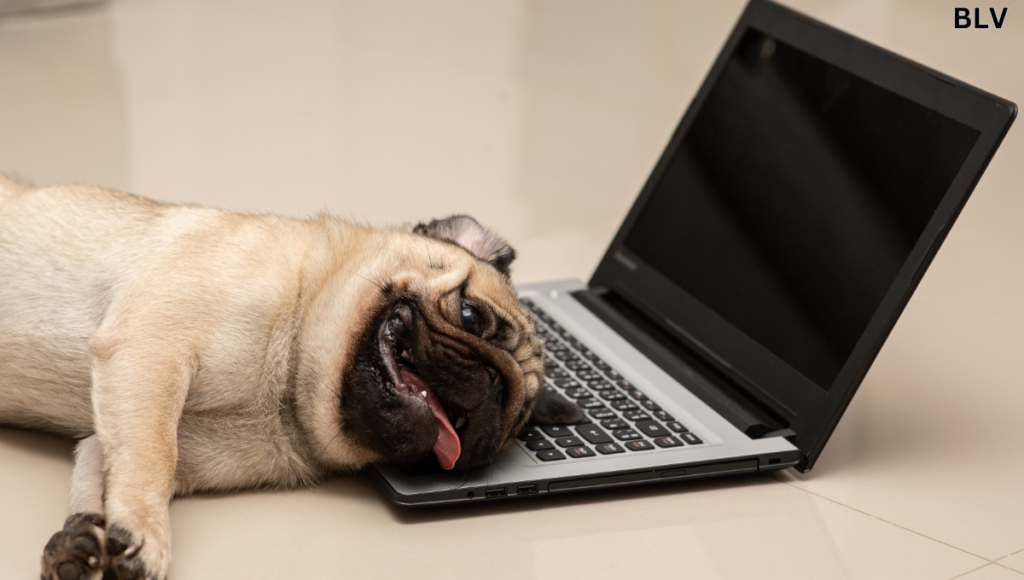
If you’re curious about why is my laptop fan so loud, you’ve come to the correct spot, my buddy.
Whether you’re a college engineering student, an entrepreneur, a programmer, or a gamer, a laptop should satisfy your demands while not obstructing your ability to work (or play) while walking.
This is, of course, related to the nature of the computers’ conveyance. Otherwise, to construct a large, portable system, you must sacrifice the tiny space between the components, and, of course, you lose the cooling solution provided by your desktop PC.
As a result, the airflow is insufficient. A laptop generates far more heat than a PC with the same amount of hardware. A laptop’s fans and ventilation help disperse heat in this tiny area.
However, do these fans adequately compensate for the heat created within the enclosed space? How high should he be positioned?
Are you in desperate need of a laptop cooler?
All of these questions are addressed in this essay. The following are five significant causes for your laptop fan becoming so loud.
- Dust fan
- Malware that is suspected
- Numerous activities are underway.
- Heating continuously
- Utilization of squash surfaces
- Power settings optimized for performance
- BIOS that is no longer supported
- Expert opinion
Why is the fan on my laptop so loud? 5 Pro Tips
Malware that is suspected

This issue is quite concerning and has the potential to be more effective than other issues. Consider a moment when you installed software from a questionable website and your laptop has slowed down as a result.
It may include viruses that reproduce on your storage and self-destruct, and the pace at which they replicate can cause your CPU and fan to overheat.
As a result, it is gaining traction. Occasionally, the malware runs numerous instances, overloading the CPU and causing the laptop to overheat.
Recently, the malware was employed to mine bitcoins (i.e., other PC resources have been illegally used for cryptocurrencies).
This not only places your computer in your ear but also significantly increases its power usage. If left unchecked, it may wreak havoc on your hardware and significantly reduce the life of your laptop.
To determine whether your computer is running properly, launch Task Manager and evaluate the apps and services listed. If you suspect something, locate it and remove the root file if it is malicious.
Malware, spyware, and viruses can all result in the loss of critical data files, which is why it is recommended that you get an anti-virus solution to keep your computer secure.
When you are ready to use your computer, you must install an antivirus program. This software will safeguard you against the numerous attacks to which Windows Defender is susceptible.
As A Result Of Fan Dust

This issue is prevalent in older laptops that remain in use. For big laptops, the majority of the time, the only reason to increase the fan speed is to clear away the dust that has accumulated on the motherboard, on the fan, or in the vents.
This is a common problem with older devices, as users lose interest in keeping them clean. If this is the first time you’ve attempted to clean your laptop, here is a fantastic place to start. You can do it yourself with a few safeguards.
- Disconnect the battery and any other source of power.
- Invert the laptop so that you are facing downward.
- Proceed with the low-power generator by opening the panel, locating the fan, and drawing (even your hair dryer will work)
If you use your laptop more regularly and in an open atmosphere, it is more likely to accumulate dust quicker than the dust in the room, but this is true even if your laptop is still under warranty. If that is the case, you will remove it as an element.
Too Many Running Processes

Occasionally, your computer’s CPU or GPU may overheat. This is understandable while running apps in the front or background.
However, even when your computer is inactive (as you state), performance appears to be deteriorating and the laptop appears to be overheating.
When you open Task Manager, you will notice several instances of Services Host, Chrome, and other apps that will not occupy your CPU in the future.
This is the most prevalent issue and is readily resolved. Although hosts of services are essential to operate Windows services, they should be kept secure in general.
You can disable some hazardous services by accessing Services (by pressing Windows + R and entering Services.msc).
Certain beginning apps consume a significant amount of CPUs as well, and you can safely terminate their activity.
On the other hand, it may necessitate a laptop upgrade – particularly if you require startup-running apps.
Heating continuously
After extended usage, the laptop fan may not be able to dissipate enough heat. It’s difficult to maintain the pace when the PC slows and having a loud fan is too distracting while you’re juggling a lot of work. ۔
As a general guideline, if you’ve been working on your laptop for an extended period of time, it’s better to work in an air-conditioned environment.
Alternatively, you may get a laptop cooler to assist keep your laptop cool and your laptop fan running. Outdoor laptop coolers are quite inexpensive and will save you a lot of money.
If you own a smart laptop with a high-end CPU and GPU, chances are you’re using it to play AAA games or run demanding programs like CAD.
Considering all of this, a laptop fan can effectively remove the heat created by these unusual pebbles. Invest in a laptop cooler — it will prevent your processor from frying!
Power settings optimized for performance
Windows has power-saving capabilities for users that prioritize battery life above performance. Comfortable consumers, and even some professionals, may be unable to utilize their CPUs to their full potential.
With high-performance power settings, all power-saving capability is disregarded, and some components are not permitted to cool down – even while the computer is inactive. As a result, the laptop outperforms itself for no reason.
Reduced power settings will impair performance by lowering the processor’s power limit and increasing link power management for PCI Express devices (i.e. your GPU). This will result in increased energy savings.
To modify your power settings, perform the following steps: –
- Activate the Control Panel
- Navigate to Hardware and Sound.
- Navigate to Power Options.
- Choose Power Saver
If the performance is insufficient, you might choose a balanced one. Alternatively, you can customize the power plan to your liking.
FAQs on Why is My Laptop Fan So Loud?
Do you find yourself wondering why your laptop fan is making so much noise? Well, fear not! We’ve compiled a list of common questions and answers to help you get to the bottom of the issue.
From simple solutions like cleaning your fan to more complex ones like optimizing system processes, we’ve got you covered. So sit back, relax, and let us help you tame that noisy fan.
Is it a problem if the fan on my laptop is too loud?
Is it a problem if my laptop’s fan makes some noise? Loud machine fans and laptop fans are indications of a problem. When you hear a computer fan, you know that the computer is working harder than necessary.
Why is my laptop’s fan constantly running?
The persistent CPU consumption that causes the laptop fan to run is most likely caused by Windows Updates or other applications.
While it is normal for the fan to speed up as the CPU temperature rises, smaller CPUs may require fans to run more often to avoid overheating.
Why is the fan on my HP PC so loud?
If a fan continues to run at a high speed for an extended period of time, it is conceivable that it is out of control or that the system is too hot.
Open the task manager, check for applications that are consuming excessive system resources, and modify the power settings, all while the BIOS is upgrading to keep the system cool.
Why is my laptop fan so loud?
There could be several reasons why your laptop fan is so loud. One common reason is that your laptop is overheating and the fan is working overtime to try to cool it down.
Can a dirty laptop fan cause it to be loud?
Yes, a dirty laptop fan can cause it to be loud. When dust and debris build up on the fan blades, it can cause the fan to become unbalanced, which can result in increased noise.
How can I fix a loud laptop fan?
To fix a loud laptop fan, you can try cleaning it with compressed air or a soft brush. You can also check to see if any processes or programs are running on your laptop that are causing it to overheat.
Is it normal for a laptop fan to be loud?
While some laptop fans are louder than others, it is not normal for a laptop fan to be excessively loud. If your laptop fan is making a lot of noise, it is likely a sign that something is not functioning properly.
How can I prevent my laptop fan from getting loud?
To prevent your laptop fan from getting loud, make sure to regularly clean it and keep it free from dust and debris. You can also invest in a laptop cooling pad, which can help to dissipate heat and reduce fan noise.
Could a malfunctioning fan be the reason for a loud laptop fan?
Yes, a malfunctioning fan can be the reason for a loud laptop fan. If the fan is not working properly, it may be running at a higher speed than normal, which can result in increased noise.
Can a software update fix a loud laptop fan?
In some cases, a software update may fix a loud laptop fan. Updates can sometimes address issues with power management or system processes that may be causing your laptop to overheat and the fan to work harder.
Conclusion of Why Is My Laptop Fan So Loud
In conclusion, having a loud laptop fan can be a frustrating and disruptive experience. However, understanding the common reasons behind it and taking preventive measures can help reduce or eliminate the noise.
By regularly cleaning your laptop, monitoring your system processes, and investing in a cooling pad if necessary, you can improve your laptop’s performance and extend its lifespan.
Don’t let a noisy fan bring you down – take action today and enjoy a quieter computing experience.
Related: Does RAM Affect Streaming

![9 Best Cheapest Laptops for Cricut Maker in April 2024 [Expert Recommended] 9 Cheapest Laptops for Cricut Maker](https://bestlaptopsventure.com/wp-content/uploads/2024/03/Cheapest-laptops-for-cricut-maker.jpg)
![How to Clean MacBook Keyboard? [Easy ways] 10 How to Clean MacBook Keyboard](https://bestlaptopsventure.com/wp-content/uploads/2024/03/how-to-clean-a-macbook-keyboard-1024x536-1.jpg)
![9 Best Laptops For Notary Signing Agents in April 2024 [Expert Recommended] 11 Best Laptop For Notary Signing Agents](https://bestlaptopsventure.com/wp-content/uploads/2024/04/best-laptop-for-notary-signing-agents.jpg)
![9 Best Laptops For College Students Under 500 Dollar in April 2024 [Expert Recommended] 12 Best Laptops For College Students Under 500 Dollar](https://bestlaptopsventure.com/wp-content/uploads/2024/02/best-laptops-college-students-500-dollar.jpg)
![9 Best Laptops With Webcam in April 2024 [Expert Recommended] 13 Best Laptops With Webcam](https://bestlaptopsventure.com/wp-content/uploads/2024/03/Best-laptops-with-webcam-1024x536-1.jpg)
![9 Best Laptops For Watching Movies in April 2024 [Expert Recommended] 14 best-laptops-for-watching-movies](https://bestlaptopsventure.com/wp-content/uploads/2024/02/Best-laptops-for-watching-movies.jpg)
![9 Best Dell Laptop For Cyber Security in April 2024 [Expert Recommended] 15 Best Dell laptop for cyber security: Powerful, reliable, and secure, this Dell laptop ensures top-notch protection against cyber threats.](https://bestlaptopsventure.com/wp-content/uploads/2024/03/best-dell-laptop-for-cyber-security.jpg)
![9 Best 2 In 1 Laptops Under $700 in April 2024 [Expert Recommended] 16 Best 2 In 1 Laptops Under $700](https://bestlaptopsventure.com/wp-content/uploads/2024/03/best-2-in-1-laptops-under-700.jpg)
![9 Best Laptops for Cricut Explore 3 in April 2024 [Expert Recommended] 17 Best Laptops for Cricut Explore 3](https://bestlaptopsventure.com/wp-content/uploads/2024/03/best-laptops-for-cricut-explore-3-1024x536-1.jpg)
![9 Best Laptops for Interior Design in April 2024 [Expert Recommended] 18 Best Laptops for Interior Design](https://bestlaptopsventure.com/wp-content/uploads/2024/02/Best-laptops-for-interior-design.jpg)